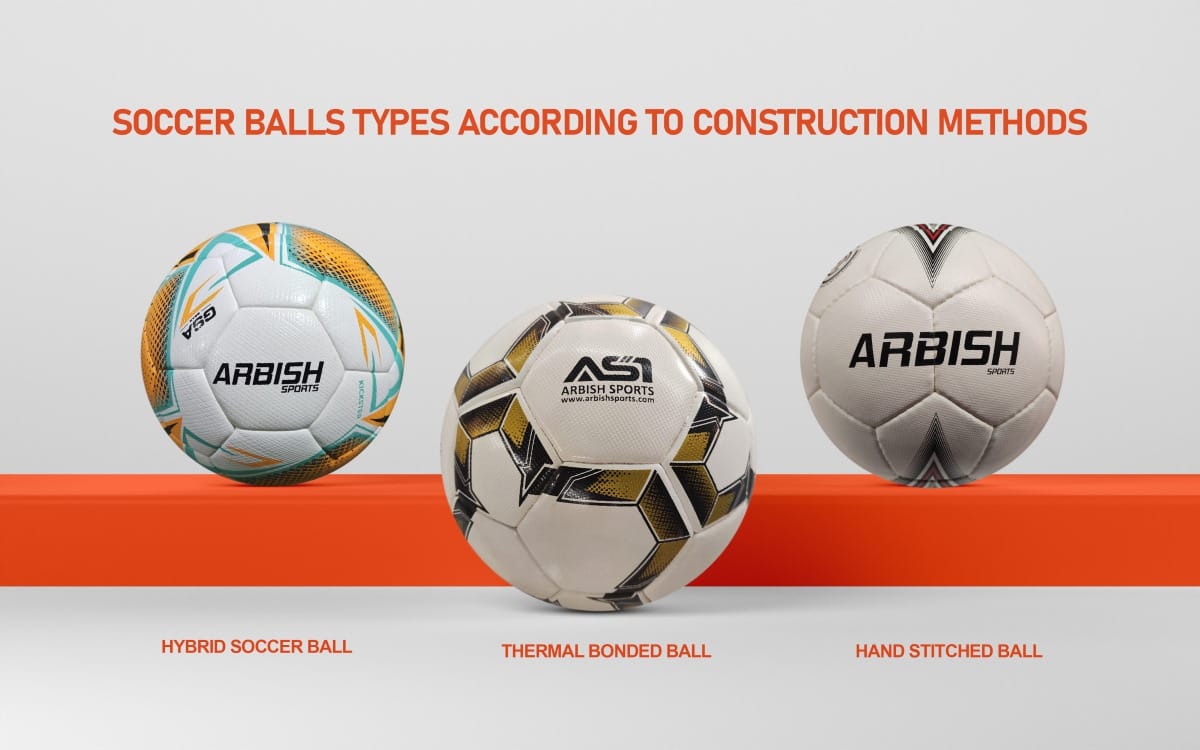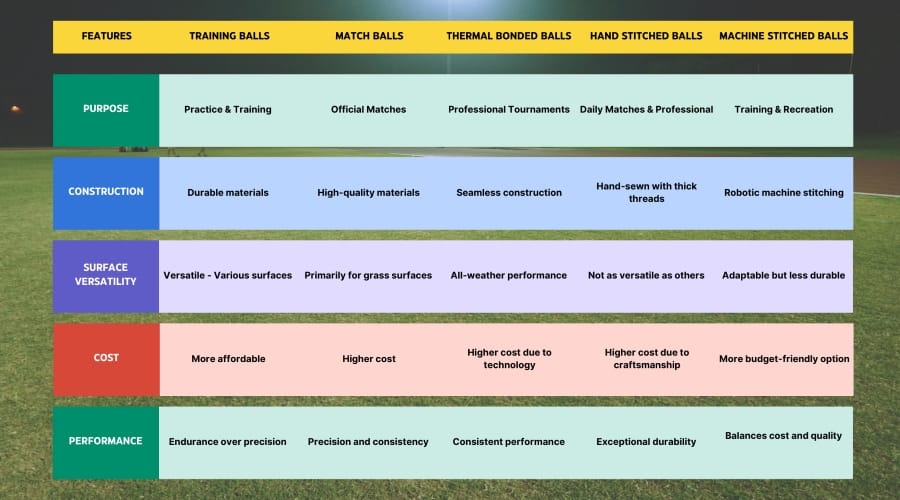Hand-Stitched vs. Machine-Stitched vs. Thermal Bonded vs. Hybrid Soccer Balls: Which is Right for You?

Table of Contents
ToggleWhen it comes to soccer balls, the market offers a variety of options that cater to different needs, preferences, and playing conditions. Among the most popular types are hand-stitched, machine-stitched, thermal bonded, and hybrid soccer balls. Each type has its unique features, advantages, and drawbacks.
Choosing the right soccer ball is crucial for optimal performance and durability. While the game has evolved significantly over the years, the fundamental component, the ball, remains a constant. The stitching method employed in a soccer ball directly impacts its characteristics, such as weight, bounce, durability, and feel. This article delves into the intricacies of hand-stitched, machine-stitched, thermal bonded, and hybrid soccer balls to help you make an informed decision.
1. Hand-Stitched Soccer Balls
Overview: Hand-stitched soccer balls are considered a premium choice, known for their superior craftsmanship and durability. These balls are stitched by skilled workers using strong threads, often made of polyester or Kevlar, ensuring that the panels are securely fastened.
Hand-stitched balls often have a heavier weight and a more pronounced “pop” when struck, which some players find appealing.
Advantages:
Durability: Hand-stitched balls are typically more durable than their machine-stitched counterparts. The stitching is tight and robust, making the ball resilient to wear and tear.
Performance: These balls provide a softer touch and better control, which is particularly important for players focused on technique and precision.
Professional Use: Many professional leagues and tournaments prefer hand-stitched balls due to their consistent performance and high quality.
Disadvantages:
Cost: The meticulous craftsmanship involved in hand-stitching makes these balls more expensive.
Time-Consuming Production: Since they are handmade, the production time is longer, which can limit availability.
Best For:
- Professional players
- Competitive matches
- Training sessions that demand precision
2. Machine-Stitched Soccer Balls
Overview: Machine-stitching is a more efficient and cost-effective method compared to hand-stitching. Machine-stitched soccer balls are produced using automated machinery, which stitches the panels together quickly and efficiently. These balls are commonly used for recreational play and training.
Advantages:
Cost-Effective: Machine-stitched balls are generally more affordable, making them accessible to a wider range of players.
Mass Production: The automation process allows for quick production, ensuring a steady supply.
Consistent Quality: Modern machinery ensures that each ball meets standard specifications, providing reliable quality.
Disadvantages:
Durability: While machine-stitched balls are durable, they are not as robust as hand-stitched ones, especially when exposed to rough playing conditions.
Feel: These balls tend to be firmer, which can affect control and touch, making them less ideal for advanced players.
Best For:
- Casual players
- Recreational play
- Training sessions with a focus on fitness and drills
3. Thermal Bonded Soccer Balls
Overview: Thermal bonding is a relatively new method that involves using heat and pressure to fuse the outer layers of the ball together. This process eliminates the need for stitching, resulting in a seamless construction. Thermal bonded balls are known for their exceptional durability, water resistance, and consistent shape. They are often used in high-level competitions due to their reliable performance.
Advantages:
Water Resistance: The absence of seams reduces water absorption, making these balls ideal for wet conditions.
Consistency: The smooth surface provides a more predictable flight path, which is beneficial for accurate passing and shooting.
Longevity: Thermal bonded balls maintain their shape and performance over time, even with heavy use.
Disadvantages:
Cost: These balls are often on the pricier side, similar to hand-stitched balls.
Firmness: The thermal bonding process can make the ball feel firmer, which might not appeal to all players.
Best For:
- Competitive matches in various weather conditions
- Players seeking consistency in performance
- Training on wet or uneven surfaces
4. Hybrid Soccer Balls
Overview: Hybrid soccer balls combine elements of different stitching methods. For example, a hybrid ball might have a machine-stitched outer layer and a thermal bonded inner layer. This approach offers a balance of durability, weight, and feel. Hybrid balls are a popular choice for players who value both performance and affordability.
Advantages:
Balanced Performance: Hybrids offer a good mix of durability and control, making them suitable for various levels of play.
Affordability: While they offer many of the benefits of hand-stitched balls, hybrids are generally more affordable.
Versatility: These balls perform well in a range of conditions, making them versatile for different playing environments.
Disadvantages:
Varied Quality: The quality of hybrid balls can vary depending on the manufacturer, so it’s important to choose a reputable brand.
Middle Ground: While hybrids offer balanced performance, they may not excel in any one area compared to specialized balls.
Best For:
- Amateur and semi-professional players
- Training across different environments
- Budget-conscious players who still want quality

Which Soccer Ball Should You Choose?
The best soccer ball for you depends on your personal preferences, playing style, and budget. If you prioritize durability and a traditional feel, a hand-stitched ball might be the ideal choice. If you prefer a lighter ball with a softer feel, a machine-stitched or hybrid option could be suitable. For exceptional durability and consistent performance, a thermal bonded ball is worth considering.
No matter your choice, investing in a quality soccer ball can significantly enhance your game, providing better control, durability, and overall performance on the field.
ASI Soccer Company: Your Trusted Manufacturer for Premium Soccer Balls and Sportswear
ASI Soccer Company, based in Sialkot, Pakistan, is proud to manufacture all the soccer ball types mentioned in this guide, including hand-stitched, machine-stitched, thermal bonded, and hybrid soccer balls. With a focus on quality and performance, ASI Soccer offers products designed to meet the needs of players at all levels, from casual enthusiasts to professionals. In addition to its soccer ball expertise, ASI’s apparel division, Arbish Sports, specializes in producing high-quality sportswear for athletes, ensuring top-notch performance and comfort on and off the field.
- Facebook
- Twitter
- Linkedin
- Whatsapp





